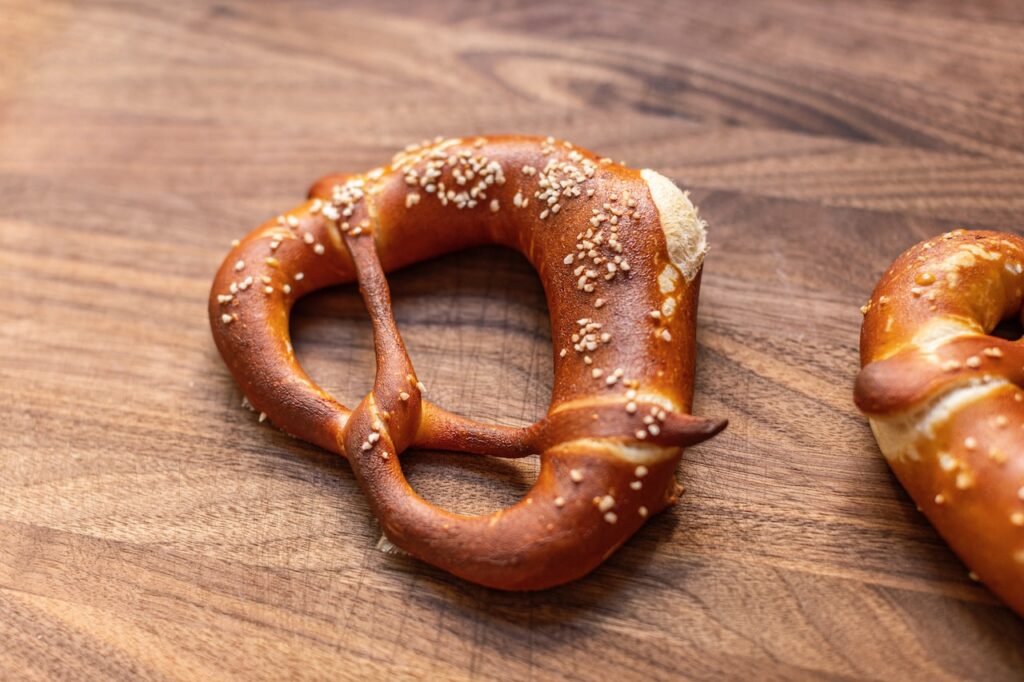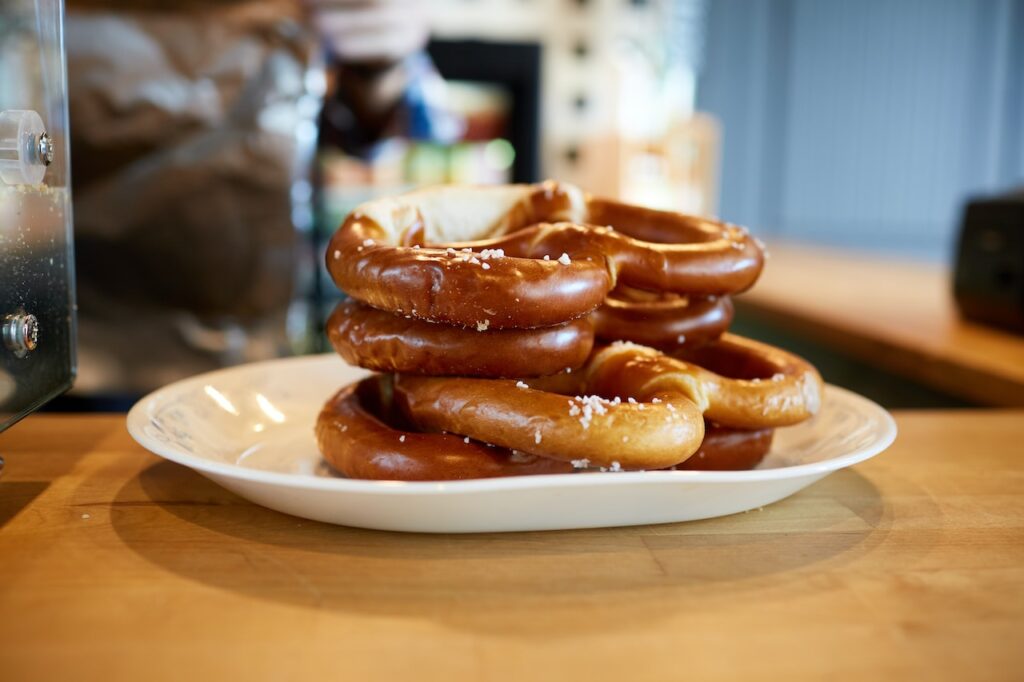We all have favorite snacks, like chocolate and pretzels. Have you ever wondered: Can dogs eat pretzels too? If you’re curious about it, this guide will tell you all the important information about whether dogs can eat pretzels and what you should be careful about.
Table of Contents
Benefits Of Feeding Pretzels
Even though dogs shouldn’t eat pretzels all the time, having a little bit can be okay and even good for them.
Pretzels can give your dog fiber, which helps their tummy work well. You can give a small piece of pretzel as a reward or snack during training.
Pretzels can make your dog happy by adding something different to their diet. But, it’s important to be careful. Only give a little, and make sure the pretzels don’t have salt or yeast.

Side effects of pretzels in dogs
Pretzels are a tasty and crunchy snack that many people enjoy. But when it comes to our furry friends, like dogs, we need to be cautious about what we give them.
Pretzels often have salt, which gives them their special taste. But dogs can’t handle salt like humans. Too much salt can cause serious issues in dogs, like making them very thirsty and damaging their kidneys.
When dogs eat salty foods, they get extra thirsty and might not have enough water. This can lead to an imbalance in their body and dehydration, which is not good.
Eating too much salt can hurt a dog’s kidneys. Kidneys filter out bad stuff and extra salt, but too much can damage them over time.
Also, pretzels might have other things that can be bad for dogs, like onion, garlic, or chocolate. These can cause tummy problems or even be deadly.
So, it’s best to keep pretzels away from dogs. The high salt can make them very thirsty and hurt their kidneys, and other ingredients might be harmful. Stick to dog food to keep your furry friend safe and healthy.
Some related foods that dogs can eat are Sardines, Cheerios, or Mustard

Can Dogs Eat Pretzels?
Many dog owners wonder if their furry friends can eat pretzels. Pretzels are a tasty snack, often enjoyed with beer. But are they safe for dogs?
Yes, dogs can eat pretzels, but there are important things to remember. Pretzels usually have salt and yeast, which can be harmful to dogs if they eat too much. Some dogs might also have trouble with gluten, found in wheat flour.
If you want to share a pretzel with your dog, make sure it’s unsalted and doesn’t have yeast. Don’t give them pretzels often or in large amounts. It should be a special treat once in a while.
Also, make sure your dog has water when eating pretzels. The salt can make them thirsty, and dogs need to stay hydrated.
If your dog is sensitive to gluten, it’s better to skip pretzels. Gluten can cause stomach issues for dogs.
Remember, pretzels should only be a treat sometimes, not a regular part of their diet. There are other healthier snacks for your dog to enjoy.
What to do when a dog eats pretzels?
Before giving your dog pretzels, the first thing to do is check what they are made of – look at the ingredients. This is crucial because if there are things that can be harmful to dogs, it’s best not to give them.
This is especially true for store-bought and pre-cooked pretzels. If you want to make them at home, make sure you know which foods are not good for dogs and avoid using them.
Generally, the classic pretzel recipe uses ingredients that are safe for dogs. Be careful not to give too many because, even though they taste good, they are still sugary.
If your dog eats pretzels and seems uncomfortable, take them to the vet right away. The vet will check and give the right treatment if needed. They might suggest giving your dog easy-to-digest food for a few days to help their tummy.
Remember, it’s important to prevent problems. Keep pretzels and other human foods away from your dog. It’s better to be safe and protect your dog’s health than risk causing problems.
In general, pretzels are not safe for dogs because of the spices and other things they might have. Always ask your vet if you’re unsure about giving a specific food to your dog.

Can dogs eat Spicy pretzels?
Spicy ingredients, like chili and pepper, can be in pretzels. But these things are not good for a dog’s stomach. They can cause problems and make the tummy feel uncomfortable.
So, it’s better to skip pretzels with spicy stuff in them when you want to share a snack with your dog.
Can dogs eat sweet pretzels?
Sweet pretzels with sugar are not good for dogs. Sugar can harm their teeth and make them gain too much weight.
Some pretzels might use a sugar substitute called xylitol instead of sugar. This can be very dangerous for dogs and even life-threatening.
Be careful with cinnamon pretzels too. Cinnamon itself is usually okay for dogs, but the powder can be tricky and cause problems if it goes the wrong way in their throat.
Can dogs eat Chocolate pretzels?
Pretzels covered in chocolate are a big no for dogs. Chocolate has something called theobromine, and even a little bit can be bad for dogs.
Especially, pretzels with dark chocolate are super dangerous for dogs. So, it’s important to keep these treats far away from your furry friend.
Can dogs eat hard pretzels?
Hard pretzels can be tough on your dog’s teeth. If you want to give your dog hard pretzels, make sure to break them into small, bite-sized pieces.
This way, you also avoid the risk of your dog swallowing a big piece and having trouble breathing. Keep it small and safe!

In summary: Can dogs have pretzels?
Dogs should not eat pretzels because they can have things like salt, sugar, spicy stuff, or chocolate that can be bad for them. If you want to share a snack with your dog, it’s best to stick to treats made just for dogs to keep them happy and healthy. Remember, it’s important to ask a vet if you’re ever unsure about giving your dog a specific food.